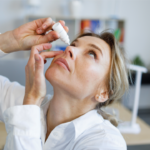
Dr. Karen Jensen received her degree in naturopathic medicine from the Canadian College of Naturopathic Medicine (CCNM) in Ontario in 1988. She is a well-known lecturer, has written extensively for health magazines, and has appeared regularly on television and radio stations across North America. She is the author or co-author of seven books, the most recent of which is Women’s Health Matters: The Influence of Gender on Disease. Although Dr. Jensen is retired from practice, she continues to write books and articles on the naturopathic approach to wellness.
Recently, Women’s Voice had the opportunity to talk with Dr. Jensen to find out more about her new book Women’s Health Matters: The Influence of Gender on Disease.
Q: What inspired you to write your new book?
This book is a culmination of my life’s work – 25 years of experience in clinical practice, combined with the shared knowledge of many doctors who mentored and inspired me over the years. Empathetic listening to my patients helped me connect the art of medicine with the reality of medical practice, allowing me to see the links between the patient experience and scientific evidence.
Since I started clinical practice in 1988 women’s health has always been a main focus. My first book on women’s health came out in 1999, when hormone replacement therapy was all the rage, but very few health care practitioners were talking about the risks. I felt strongly that women needed to have more information in order to make informed choices about the types of treatment they were choosing. Now, fast forward 20 years to my new book Women’s Health Matters: The Influence of Gender on Disease. The purpose and inspiration for this book remains the same as it was 20 years ago – providing what I consider important and sometimes critical information so women can make safe and effective health care choices.
Q: I think many readers will find they were completely unaware of some of the data you’ve presented in this book.
I agree! Most people don’t appreciate how differences in gender can and do influence many common diseases. Even after all of the years in my field of medicine, I too was also unaware of much of the data on the sex and gender gap in disease and clinical research. Did you know that the clinical trials designed to study the safety and effectiveness of drugs and other medical treatments are primarily done with men, and that, historically women have been treated as “small men”? Can we apply what we learn from male – be it cells, rodents, or humans – to a women’s physiology? No, we cannot.
Here’s why: The differences between men and women are determined by very complex interactions at the cellular level, including differences in brain structure, how genes are expressed on X and Y chromosomes, women’s higher percentage of body fat, plus differences in hormones, gut physiology, social experiences, and more. According to the Institute of Medicine, every cell in the body has a sex, which means that women and men are different even down to the cellular level. This also means that diseases, treatments, and chemicals will affect the sexes differently.
Q: Can you give us a few examples of the gender differences in some common health conditions?
There are several, but for example, sex and gender differences in cardiovascular diseases are well-investigated, and there is strong evidence that men and women face different risk factors and have different treatment outcomes. Despite some improvements in the rate of cardiovascular deaths over the last decade, women still fare worse than men after a heart attack, and heart disease in women remains underdiagnosed and undertreated. Of course, cardiovascular diseases are by no means the only area in which men and women differ in their susceptibility to and survival of disease. In addition to “women only” health conditions, three times as many women suffer from autoimmune diseases as men, and women are more susceptible to Alzheimer’s disease, chronic fatigue syndrome, osteoporosis, diabetes, insomnia, anxiety and depression, urinary tract disorders, irritable bowel syndrome, and eating disorders. However, despite the wealth of data on differences, medical practice does not sufficiently take gender into account in diagnosis, treatment, or disease management.
Q: You mentioned clinical research earlier. Do you advocate more studies being done to understand the kind of gender disparities your books talks about?
Yes definitely… in addition to the disease gender gap, there is also a gender gap in medical research. Our long history of excluding women from clinical trials is negatively affecting women’s health. Today, even with mounting evidence of the gender differences in disease, women are often being ignored when it comes to health research. This has real consequences. Millions of women and men are prescribed the same drugs every day, yet women are more likely than men to experience adverse drug reactions. In fact, 80% of prescription drugs pulled from the US market from 1997 to 2001 caused more side effects in women. Metabolic differences determine how drugs are released and excreted, leading to additional risk factors for women. Despite these differences women are prescribed the same dosage as men for almost all drugs. Women are not just men with “boobs and tubes”.
Q: Let’s talk about some of the alarming trends you are seeing in women’s health today?
STRESS! – It’s on the rise, and according to the Center for Disease Control and Prevention, up to 90% of all illness and disease is stress related. Also, a recent survey by the American Psychological Association showed that almost 50% of the women participating in the survey reported that their stress had increased over the past five years, compared to 39% of the men. The effects of chronic stress are far-reaching and one of the main causes of inflammation. Medical research is starting to recognize that stress is responsible for most chronic health conditions including mental health disorders, gastrointestinal problems, cardiovascular disease, sleep problems, weight gain, and memory or cognitive impairment.
Q: Are there specific organs that are meant to help the body cope with the added stress in our world today?
Yes, the primary stress response in the body is due mainly to the relationship between areas of the brain and the adrenals – hypothalamus-pituitary adrenal axis (HPA) – which triggers the production and release of stress hormones. When this system is no longer able to adapt to the stressful demands on it, people will start to experience stress related symptoms such as insomnia, anger, anxiety, fatigue, headaches, to name a few. If left unchecked the immune system is weakened and more chronic disease develops.
Q: Do the adrenals affect women’s hormones?
That is a great question! The adrenals play an important role, especially during the more dramatic hormonal changes during perimenopause or menopause. When the adrenal glands are working properly, they produce adequate amounts of precursor hormones that are further synthesized into estrogens and testosterone to balance the diminished production from the ovaries. However, many women today have adrenal insufficiency due to chronic stress, and the adrenal glands are unable to respond to these additional demands. As a result many women have a more difficult time with the transition into menopause.
Q: Is there something women (and men) can do to support their adrenal glands?
Yes definitely. The obvious answer is try to balance the demands in your life with some activities that you enjoy and find relaxing. Sometimes this is easier said than done. Avoid stimulants such as coffee and sugar which we naturally reach for when tired or stressed. In clinical practice I would commonly recommend the supplement called AdrenaSense. It contains several herbs that have been studied extensively and have proven very effective during times of increased stress.
Q: It seems more and more women are being diagnosed with thyroid problems today. Do you have any thoughts on what is causing this increase?
The tightly regulated feedback control system of the thyroid gland is very sensitive to the chemicals we eat, breathe, or are exposed to through the environment. This system is also affected by a variety of disease processes. Stress, once again, is a factor in thyroid disorders, especially in the presence of HPA adrenal dysregulation. So really it is the same message – support the adrenals, try to avoid chemicals and toxins in your food and environment, and if you suspect you have a thyroid problem, see your health care practitioner for blood tests. My new book provides much more detail on thyroid disorders as well as all of the topics mentioned in this interview.
Q: Our readers are plagued with sleepless nights and research shows sleep problems affect up to 45% of the world’s population. Do you think stress plays a role?
Yes, and I find this very alarming. Even younger children and teens are having sleep problems! Chronic stress and elevated stress hormone levels are among the main causes of insomnia. Insomnia then causes an increase in stress hormones resulting in a vicious cycle that is difficult to control. Most evidence suggests a female predisposition for insomnia that becomes more significant as we age. Distinct hormonal and physical changes at specific times in a woman’s life, such as puberty, pregnancy, and menopause, can impact sleep health. Personally I started to experience chronic insomnia at the onset of menopause and I still have periods of times when I struggle. Over the years I have found various herbs to be helpful including passionflower, skullcap, linden flower, and California poppy but never found them combined in high enough doses in one product, until recently. I am very excited about a new product on the market called SomniSense™. It is proving very effective for people with sleep problems as well as helping with anxiety.
Q: Earlier you mentioned a relationship between stress and inflammation. Can you explain that further?
Yes. During periods of stress, the stress hormone cortisol is released as a coping mechanism. Cortisol has potent anti-inflammatory properties and blocks the inflammatory response. In small quantities, cortisol is a friend and essential. However, in times of chronic stress, elevated cortisol levels slow down the production of anti-inflammatory messengers, resulting in chronic inflammation and immune suppression.
Q: What are some of the common conditions that have inflammation as an underlying factor?
Although inflammation has long been known to play a role in diseases like asthma, arthritis, and gastrointestinal disorders, now we are finding that it is associated with dementias such as Alzheimer’s disease, depression, cardiovascular disease, diabetes, and high cholesterol. In other words, all of these conditions can all be related to chronic inflammation in the body. A study published in JAMA Psychiatry 2016, examined data from 14,275 people, researchers found that people who had depression had 46% higher levels of C-reactive protein, which is a marker for inflammation. Those with the most severe forms of depression also showed the most inflammation. There are various medications or natural health products that can be effective for people with depression or other mood disorders. Natural products such as curcumin, boswellia, omega-3s, and chamomile all have anti-inflammatory properties. Brain Defence™ (sold as Brain Fix in the US) contains powerful anti-inflammatory herbs along with bacopa and ashwagandha for stress support.
It is also very important to address the inflammation factor in dementias as there is evidence linking inflammation with degenerative changes in the brain and women account for 72% of the Alzheimer’s cases and 47% of vascular dementias. More women than men get Alzheimer’s, in part because women tend to live longer than men and the chances of developing Alzheimer’s increases with age. But new research suggests there may be genetic reasons as well. Women who carry the apolipoprotein E type 4 allele (APOE-e4) gene, which increases the risk for Alzheimer’s, are more likely to develop the disease than men who have the same gene.
Q: So, how can you address inflammation to reduce the risk of dementia?
In addition to the herbs in Brain Defence (sold as Brain Fix in the US) mentioned earlier, diet, particularly the Mediterranean diet, and exercise are extremely important. Specific nutritional supplements such as phosphatidylserine, curcumin, omega-3s, antioxidants such as grapeseed extract, and probiotics can all help provide nutrients to support cognition and brain function in general. All of these ingredients can be found in a product called Daily Brain™, (sold as 3 Brain Total in the US) in a once daily packet.
Q: What is the take home message you want for your readers?
It’s the gender issue. Many health care practitioners are not aware of the gender bias in clinical studies and the implications for women’s health. As a result, it becomes a bottom-up situation, requiring the public, and women in particular to educate themselves. As a woman, you have choices. You can take the proactive approach by making health care choices that promote greater health and vitality, and reduce the likelihood of disease occurring. And, symptoms of disease strike, you will be armed with a greater level of knowledge and awareness, putting you in a better position to question whether the treatments you are receiving are safe, effective and specific to your gender. That’s the purpose of my book – to offer safe and effective ways to prevent and help treat health problems that are specific to, or more common in women.
According to the Institute of Medicine, every cell in the body has a sex, which means that women and men are different even down to the cellular level. This also means that diseases, treatments, and chemicals will affect the sexes differently.
As a woman you have choices. You can take the proactive approach by making health care choices that promote greater health and vitality, andreduce the likelihood of disease occurring. And, should symptoms of disease strike, you will be armed with a greater level of knowledge and awareness, putting you in a better position to question whether the treatments you are receiving are safe, effective, and specific to your gender.














